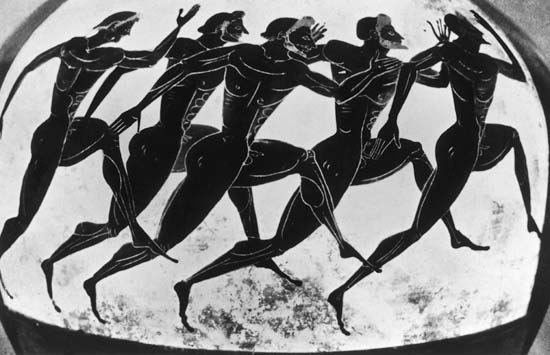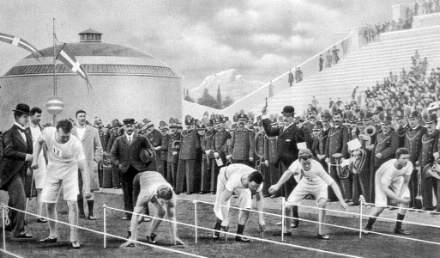The Olympic Games are an enormous stepping stone in sports history. The games have been around for centuries, dating all the way back to 776 BC. Beginning in Olympia, Elis, many gathered to watch and compete in games that would someday shape the way modern society viewed sports. Since the re-birth of the games in the nineteenth century one now looks back curiously and excitedly at the rich past of these games. Looking at the beginnings of these games one can learn three things. The origins, being where and when they began, the social impact it had on politics and society at the time, and how these games are continued today.
These historical games began over two thousand years ago tracing back to 776 BC and continued for nearly twelve centuries till Emperor Theodosius banned them in 393 AD naming the games as a “pagan cult”. How did these games start? How did they get to this point? These are important questions one must ask in order to understand the origins and significance of these games.
There are several myths on how these games began, but the two most popular are those of Hercules and/or Pelops. Pelops was said to be a Prince from Lydia (Asia Minor) who wanted to  marry Hippodamia, the princess of Pisa. In order to have her hand in marriage he had to race all the other suitors. He won the race and instituted the games to celebrate his victory. The story of Hercules tells of the Greek hero taking over the city of Elis. He built a monument to his father Zeus, taught the warriors how to wrestle, and built the track on which races were held. Nobody truly knows how the Olympics began, but it is in high belief that they were started as a tribute to the Greek gods. (Remijsen & Clarysse, 2012) Even though the games had a secular character that aimed to show the athletic ability of young people and encouraged good relations between Greek cities, based on archaeological findings religion stood at the heart of these games.
marry Hippodamia, the princess of Pisa. In order to have her hand in marriage he had to race all the other suitors. He won the race and instituted the games to celebrate his victory. The story of Hercules tells of the Greek hero taking over the city of Elis. He built a monument to his father Zeus, taught the warriors how to wrestle, and built the track on which races were held. Nobody truly knows how the Olympics began, but it is in high belief that they were started as a tribute to the Greek gods. (Remijsen & Clarysse, 2012) Even though the games had a secular character that aimed to show the athletic ability of young people and encouraged good relations between Greek cities, based on archaeological findings religion stood at the heart of these games.
The ceremonies were an important ritual in the games. It not only brought honour to themselves but to their family, town, and the gods as well. The Olympic victor received their awards directly after the competition. A Greek judge would announce the victor then place a palm branch in his hands. Spectators would throw flowers and red ribbons would be tied to the victor’s hands and head as a mark of victory. Before, after, and all throughout the games animal sacrifices were attributed to the gods or as thanks/ prayer for athletes to do well. Music was played, festivities were in motion, and a great banquet for the victors was held on the final day of the games. When Roman Emperor Theodosius I came into power he boycotted all pagan rituals when he made Orthodox Nicene Christianity the official church of the Roman Empire. Sofie Remijsen and Willy Clarysse (2012) from the University of KU Leuven tell readers that some scholars believe that the games were continued even after the ban was made. Many seem to disagree that they did continue or disagree on how long they would have continued though. (Scanlon, 1997)
The Olympic Games came to a two thousand year pause until they were re-introduced in 1896 where they took place on the historical grounds that had once hosted the games all those many years ago. Athens, Greece, is where the next generation of athletes first competed. In 1766, the site was rediscovered by Englishman Richard Chandler. It wasn’t until 1875 that digs were carried out by the Germans to try and rediscover the ancient grounds. It was after these discoveries were made that inspired a French historian by the name of Pierre de Coubertin to found the modern games.
When Chandler first brought up the idea of reintroducing the games he brought it up as something everyone could participate in. The idea didn’t come to any action though until Coubertin came up with the idea to revive the games for “amateurs” as a recreational sport or a hobby for those who already had ample income. (n/a, 2015) This meant that only the upper class could participate in these events. This made it much more appealing to the Paris Congress because they didn’t have to fear losing to the lower class. This had some effect on society at the time  because the games where a show of wealth more than skill. If you were able to participate you had enough money and time to travel and train, whereas the lower class would not. It was not until the games were opened up to the public that it had a strong social and cultural impact on society that we see today.
because the games where a show of wealth more than skill. If you were able to participate you had enough money and time to travel and train, whereas the lower class would not. It was not until the games were opened up to the public that it had a strong social and cultural impact on society that we see today.
These early games have impacted our modern society in numerous different ways. Whether it’s in the overall creation of the games or the ideas that came with and after the games, one cannot deny the domino effect this event has had in our social and political aspects of modern culture. The impact that the Olympic Games have on today’s people are similar to the impact on the Greeks. When one thinks of the games they often think of cameras and journalists, favorite athletes, and a huge stadium of cheering people. For the Greeks it was similar. Messengers and historians wrote down what happened and shared the news with the rest of Greece. Many gathered to watch the athlete from their hometown compete, and cheered them on with glee. Hundreds, if not thousands, of Greek citizens sat in a stadium surrounded by the olive trees that shared their leaves to crown the proud winners who had trained and competed in anticipating the moment they would receive glory for all their hard work. This is not unlike today’s athletes and the modern Olympics. Journalists and camera crews gather to record and spread the events. Millions gather to cheer on their favorite athlete and support their country of origin. Athletes train hard so that they can bring glory home and to themselves, all the while the world watches them from a stadium or a television. The social impact on modern and past society is evident, as we now read, write, and watch sports on a daily basis outside the Olympics.
The political impact is not as obvious as the social impact, but it still has a heavy weight on modern society. Considering what the modern Olympic movement has had to deal with, the Greek’s politics were very minimal. The Olympic Games showed that Macedonia ruled Greece, it was important for its king to assert his “Greekness” – as Thomas Scanlon (1997) puts it – by taking part in the festivals and looked to establish their Hellenic roots. Often a king or prince would compete in the events themselves to show their superiority and Greek roots. They were a way of bringing cities together for friendly competition and to keep cities “in check”. There was much controversy among different regions and cities in Greece, this was a way for the rulers to put them in their place and assert superiority and power. In comparison to modern politics the ancient Greek games seem in complex. “ ‘No kind of demonstration or political, religious or racial propaganda is permitted in the Olympic areas.’ So says chapter 5 of the Olympic charter. But the modern Olympic movement has had to contend with wars, boycotts, protests, walkouts and even terrorist attack” (Mellbye, 2011). Take the 1936, Berlin games; the games were intentionally awarded to Germany so the country could show it had regained status in Europe. With Adolf Hitler in power he tried to use the event to prove his theory of racial superiority. This failed when African-American Jesse Owens won four gold medals, but we still see an example of how the Olympics are used in a political standpoint. Tokyo became the first Asian country to host the Olympic Games. They spend billions of dollars rebuilding to show their post-war success. In 1972, Munich games terrorists came in and used the games to broadcast their message to the world to release Palestinian prisoners from Israel, this resulted in the deaths of eleven Israelis, five terrorists, and one police officer. Just recently, in the Sochi 2014 Olympic Games, the Germans came into the opening ceremony dressed in many colours showing their support for homosexual equality. The politics of today’s games go far deeper and into a whole new level in comparison to the ancient games in Greece, or even the ones that were brought to the Paris Congress in 1896.
Annotated Bibliography
Mellbye, Anne. (2011). Politics and the Olympics. Retrieved from Guardian.co.uk: http://www.theguardian.com/politics/politicspast/page/0,9067,892902,00.html
Museum, O. (2015). History of the First Ancient Olympic Games. Retrieved from Olympic.org: http://www.olympic.org/content/olympic-games/ancient-olympic-games/history/
n/a. (2015, October 30). Pierre de Coubertin. Retrieved from Wikipidia: https://en.wikipedia.org/wiki/Pierre_de_Coubertin
n/a. (2015, October 22). Theodosius I. Retrieved from Wikipidia: https://en.wikipedia.org/wiki/Theodosius_I
n/a. Brief History of the Olympic Games. (2000). Retrieved September 28, 2015, from http://www.nostos.com/olympics/
Remijsen, S., & Clarysse, W. (2012). The end of the Olympic games. Retrieved from Ancient Olympics: http://ancientolympics.arts.kuleuven.be/eng/TB008aEN.html
Remijsen, S., & Clarysse, W. (2012). The modern Olympic games. Retrieved from Ancient Olympics: http://ancientolympics.arts.kuleuven.be/eng/TE011EN.html
Remijsen, S., & Claysse, W. (2012). The program of the Olympic games. Retrieved from Ancient Olympics: http://ancientolympics.arts.kuleuven.be/eng/TB006EN.html
Sacks, D. (2005). Olympic Games. In Encyclopedia of the Ancient Greek World (Third Edition ed.). New York: Facts on File, from http://online.infobase.com/Auth/Index?aid=103520&itemid=WE49&articleId=223461
Scanlon, T. F. (1997). Olympia and Macedonia: Games, Gymnasi, and Politics. Riverside, California, United States.
Vidy, C. (2012, May 15). THE OLYMPIC GAMES OF ANTIQUITY. Retrieved October 17,
2015, fromhttp://www.olympic.org/documents/reference_documents_factsheets/the_olympic_games_of_the_antiquity.pdf
